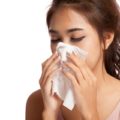
Weather is a factor most allergy sufferers don't think of when the season begins. However, it is one of the main game changers during allergy season.
Many of your allergy symptoms depend on where you live and what the weather is like there. According to WTHITV:
- Colder days eliminate the growth and spread of allergens.
- Dry conditions can prevent allergy causing plants from growing.
- Rain can lessen the severity of your symptoms by washing away pollen and impeding its ability to travel.
- Windy days will often affect you the most because they can spread allergens quickly and easily. According to Chief Medical Officer of Union Hospital Dr. John Bolinger, the wind can push pollen and other allergens deeper into your lungs and nasal pathways.
In addition, recent studies indicate that dry eye occurs most often with the beginning of spring. This is caused by the surge of airborne allergens. Dry eyes affect one in five women and one in ten men, costing the U.S. Healthcare system almost $4 billion a year.
How can you protect yourself during this varied spring weather?
- Avoid using vinyl shower curtains as they can attract and hold onto mold and other irritants.
- Don't store your coats in your main closet with other clothes. Coats can harbor pollen and other allergens, which can make your symptoms worse.
- If you are affected by dry eyes, wear goggles when doing yard work or partaking in other outside activities. If you spend a lot of time indoors, especially in your home, invest in air filters.
- Vacuum your closet regularly. If you don't clean your closet a lot, chances are among your shoes and shirts are inches of dust and other irritants. If these get on your clothes they can make your allergies even worse.
For more allergy prevention tips visit our website.









